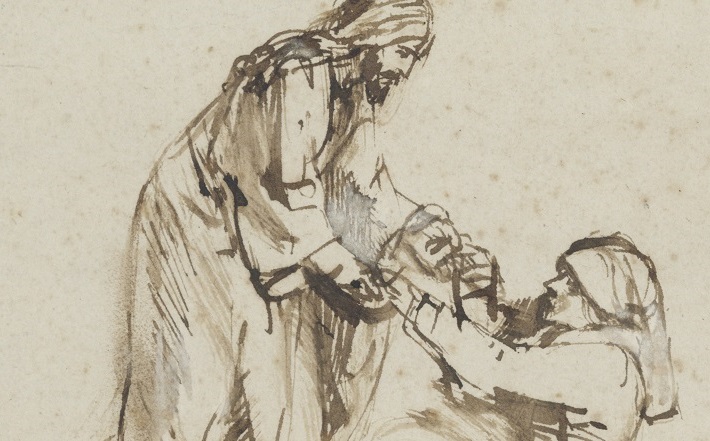Commentary on Isaiah 40:21-31
This poem is a display in exilic hope. The hope this poem provides is ultimately grounded in the claim that the God of the Bible is able to influence history beyond where inertia might otherwise take it. Because God sits above creation as both its originator and its sovereign, God is able to bring “princes to naught” and make the “rulers of the earth as nothing” (verse 23). Those are very bold claims, especially coming from a poet whose community had experienced defeat and shame. The fact that his words are bold probably also means that they were hard to believe, especially given the circumstances in which this audience found itself.
The author points to history, adorned in the guise of agricultural metaphor, to underscore his point:
Scarcely are they planted, scarcely sown,
scarcely has their stem taken root in the earth,
when he blows upon them, and they wither,
and the tempest carries them off like stubble. (verse 24)
For Isaiah 40, the ephemerality of human kingdoms is evidence of God’s sovereignty. Human regimes are like “dust in the wind,” swept away by natural forces like storms. Change is constant, especially when it comes to human societies.
Just because change is in the air, however, doesn’t mean that it will be good for anyone involved in the fallout. The additional rhetorical burden that Isaiah 40 bears is to convince its audience that God is not only capable of effecting change, but that God is also capable of moving history toward redemption. In these lines, God’s power and God’s goodness are on trial.
And in order to do that credibly, the poem also needs to acknowledge the real and legitimate pain of its audience:
Why do you say, O Jacob,
and assert, O Israel,
“My way is hidden from the Lord,
and my right is disregarded by my God”? (verse 27)
The Jews of Isaiah’s time felt overlooked and cast aside by their God. The language of hiddenness is not particular to Isaiah. Psalm 10:11 states, “They think in their heart, ‘God has forgotten; he has hidden his face; he will never see it.’” In many ways, the hidden face of God should be read alongside—and in contrast to—the shining, beaming face of God that we hear in the Aaronic blessing:
The Lord bless you and keep you;
the Lord make his face to shine upon you and be gracious to you;
the Lord lift up his countenance upon you and give you peace. (Numbers 6:24-26)
When the poet says that God hides, he is saying that God’s favor, delight, and smile are not felt in everyday life. This is an experience that people have throughout their lives in moments of acute pain, tremendous loss, et cetera. But for ancient Judah, the feeling was also corporate, dramatic, and deeply diminishing.
Having named this pain in verse 27, the poem shifts its attention to convincing the audience of two things: that God the creator is powerful and that there is a strange, mysterious power available to the weak, the weary, and those who wait.
The poem grounds these claims in God’s nature as creator:
The Lord is the everlasting God,
the Creator of the ends of the earth.
He does not faint or grow weary;
his understanding is unsearchable. (verse 28)
As creator of the entire earth, God was never out of reach for God’s people. Many deities in the ancient world were associated with particular locations and therefore limited in their scope of power (see, for example, Deuteronomy 32:8). That is not the case with God. The God of Israel created the whole earth, does not grow weary, and is infinitely wise.
What’s more, the creative power of God is especially available to those who are faint and powerless. Yhwh is the God of tired people.
But all of this still leaves the audience with a significant problem—and one that remains true in various forms for both Judaism and Christianity: When one worships a God who makes promises, one must reckon with the fact that many—if not most—of them appear to be unfulfilled. There is a delay between God’s commitments and their realization. The author of Isaiah 40 recognizes this problem and draws on a response that should be recognizable to Christians: waiting in hope.
He gives power to the faint
and strengthens the powerless.
Even youths will faint and be weary,
and the young will fall exhausted,
but those who wait for the Lord shall renew their strength;
they shall mount up with wings like eagles;
they shall run and not be weary;
they shall walk and not faint. (verses 29–31)
For Isaiah 40, there is a power at work in faithful waiting. In waiting, one can attain a strength that exceeds the vigor of youth and allows one to take flight into hope.
Hopeful waiting is a deeply important Christian practice. In fact, if one considers the broader strokes of salvation history, Christians exist within a long season of waiting, between Christ’s resurrection and the promised eschaton. In that long interim, Christians find themselves bound to the realities of a deeply tragic world that is ravaged by human sin. At the same time, they are also asked to cling to promises that God will one day make this world right, joyful, and just.
This is the deep and fundamental tension at the heart of Christianity: the claim that God is faithful and good must be asserted in the face of a daily onslaught of contradictory evidence.
This seemingly endless delay is enough for some to reject the God of the Bible altogether as untrustworthy, unreliable, or even cruel. What parent—divine or otherwise—could stand to see so many children suffer over so long a time, especially when they have the power to prevent it? For some, that’s the last straw.
But for Isaiah 40, God’s goodness is only hidden for a time. God’s work of bringing cruel princes to naught is slow and grinding but, ultimately, inevitable. History bears witness to God’s sovereignty and God’s goodness.


February 4, 2024